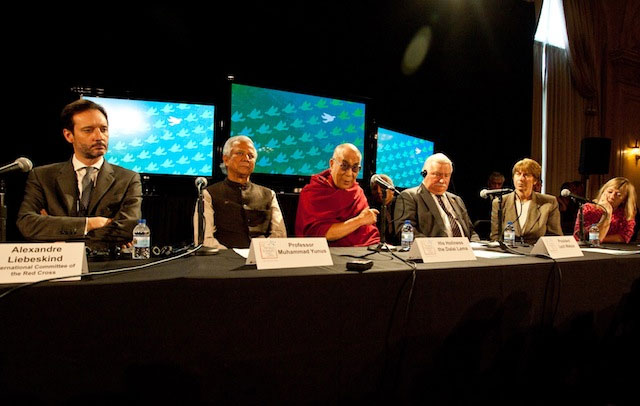A group of 12 Nobel laureates have called upon Thein Sein and Myanmar’s leadership to open an investigation into the anti-Muslim violence and make reconciliation a “top priority.”

The Nobel Peace Prize winners—including Jody Williams, Archbishop Desmond Tutu, Shirin Ebadi, Muhammed Yunus and Tawakkol Karman—released an open letter via the Nobel Women’s Initiative this Thursday. The letter condemned the ongoing violence in both Kachin and Rakhine states, and asked politicians to be mindful that despite recent upturns, there is still a lot of work to be done in Myanmar’s reform process.
“That struggle has entered a new phase,” said the group, “but a struggle it undoubtedly remains.”
The members called upon President Thein Sein to follow through on his commitment to establishing an in-country office for the UN High Commission for Human Rights. They also said there needed to be an “international, independent investigation” of the anti-Muslim violence in Myanmar.
The laureates congratulated Thein Sein on the symbolic release of political prisoners last year. However they renewed calls to have the all charges dropped against the remaining political prisoners, requesting that they be allowed to participate in the reform process “without fear of re-arrest.”
The letter echoes the sentiment of UN High Commissioner to Human Rights, Navi Pillay, who in a UN press release this Wednesday claimed that “the spread of anti-Muslim sentiment across the state [Rakhine] and beyond is threatening the reform process and requires more focused attention from the Government.”
Such warnings have arisen as Myanmar’s reform supporters are coming down from the initial high of a triumphant political turn, only to realize the vast extent of political negations that remain.
Since fellow Nobel laureate and Myanmar opposition leader Aung San Suu Kyi announced her ambition to run for President earlier this month, questions have been raised about whether the popular leader—who will turn 70 during the 2015 election—will oversee enough reform to maintain political momentum.
Despite the tone of warning, the 12 Nobel laureates commended Thein Sein and his administration on their work so far, an asked that they adopt “courage, and a steadfast commitment to tolerance” in the face of Myanmar’s ethnic issues.


